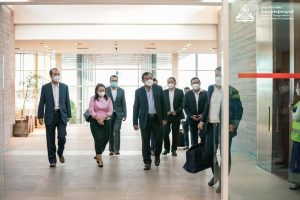Yesterday, Cambodia’s Foreign Minister Prak Sokhonn, the Association of Southeast Asian Nations (ASEAN)’s special envoy to Myanmar, held a briefing for foreign diplomats and the press to inform them of the outcomes of his second official mission to the country.
The briefing did not significantly diverge from the statement issued on July 4 that provided a bare-bones outline of Prak Sokhonn’s June 30-July 2 mission, his second to the country. The statement reported that he met with coup leader, Senior Gen. Min Aung Hlaing, who informed him of the “violence, brutality, and intimidation” of the anti-junta resistance, and promised his “full support” for Sokhonn’s mandate.
It also stated that Prak Sokhonn met with the junta’s foreign minister, Wunna Maung Lwin, its lead peace negotiator, Lt. Gen. Yar Pyae, and a group of junta-approved ethnic armed organizations and political parties.
But the briefing was notable for the hints that it offered, beyond the bland pleasantries of the official statement, of the sheer difficulties involved in trying to push the military-run State Administration Council (SAC) to implement the Five-Point Consensus. Agreed by ASEAN last April, the Consensus calls for an immediate end to violence and for “all parties” to engage in negotiations
Prak Sokhonn told the briefing that despite having achieved “some progress” on his second mission, Cambodia, this year’s ASEAN chair, would maintain the bloc’s previous policy of excluding political representatives of Myanmar’s military government from attending high-level ASEAN meetings, including the upcoming Foreign Ministers’ Meeting in early August.
“This decision was made with regret but the current circumstance is not favorable for me to invite [Wunna Maung Lwin] to join the meeting,” he said. “The nine ASEAN members have agreed so. As long as there is not enough progress, only a non-political representative is allowed to attend.”
More broadly, he said that he had used his mission to Myanmar to urge the SAC, the opposition National Unity Government (NUG), all political parties, and all ethnic armed organizations to exercise the “utmost restraint” and to negotiate for peace in Myanmar.
But despite Min Aung Hlaing pledging his “full support” to the special envoy’s mission, as per the July 4 statement, the military junta has done virtually nothing to implement it. Instead, during his two-hour meeting, Prak Sokhonn said that Min Aung Hlaing spent much of his time detailing various outrages committed by the People’s Defense Forces (PDFs) that are resisting the military administration, which the SAC has deemed “terrorists.”
Min Aung Hlaing reportedly claimed that PDF fighters were responsible for the damage to public property and the murder of government officials, teachers, and volunteer medical staff. While the killing of suspected collaborators (dalan) is undeniable, and their extent very likely underplayed by the supporters of the resistance, Min Aung Hlaing obviously did not focus on the savage atrocities committed by his soldiers, nor the mass dislocation prompted by last February’s coup. (The United Nations refugee agency reported this week that the number of displaced in Myanmar has now topped 1.1 million.)
In yesterday’s briefing, Prak Sokhonn said that he told the various Myanmar stakeholders that viewing each other as “terrorists” would not lead to “a peaceful, inclusive dialogue.” He also said that despite requesting “again and again” to meet Aung San Suu Kyi and her legal counsel, the junta again refused access to them on the grounds of her ongoing court proceedings and unspecified health conditions.
While it might be too hard to read frustration into these remarks (especially not having attended the event in person), they do seem to indicate the lack of leverage that ASEAN’s special envoy, and ASEAN as a whole, have over the military junta, which shows little regard for its image in the eyes of the outside world. In this sense it is perhaps hard to be too critical of Prak Sokhonn, given the constrained parameters of the Five-Point Consensus, which were premised on the junta’s buy-in and cooperation.
“With only six months left as the special envoy, I should say I do not have any sacred medicine or magic to resolve Myanmar problems,” he told yesterday’s briefing, according to the Cambodian journalist Chhengpor Aun. He added that all ASEAN can do is to help “coordinate a peace process and dialogue inclusive and acceptable to all stakeholders.”
As it stands, even this seems like an ambitious goal.

































